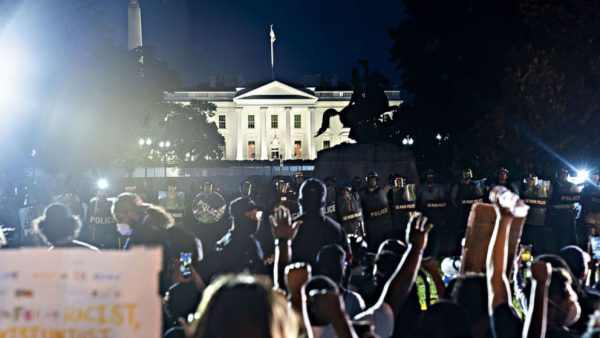And how our form of government survives with him.
Transition Integrity, 2024

Will the Democrats give up power if they lose?
Concerned about the possibility that the Democrats, lagging in popular support, might seek to disrupt the election or refuse to vacate the White House in the event of a loss, a group of constitutionally committed Americans convened a strategic exercise to consider possible responses in the event of this unfortunate circumstance. The 2024 Transition Integrity Project—modeled on the 2020 exercise of the same name—took a serious look at various scenarios that might emerge based on the assumption that the incumbent—regardless of who occupies the Oval Office—is always the greatest threat to a peaceful transition of power.
In the leadup to the 2020 election, mainstream media outlets fretted that President Trump would likely refuse to leave office in the event of an electoral defeat. The fact that they were proven wrong does not seem to have deterred Democrats in making similar dire predictions for 2024. President Biden himself recently warned that Trump will not concede if he loses. These claims are ridiculous, not least because Trump no longer occupies the White House: his refusal to concede would not remove Joe Biden from the Oval Office, much less allow Trump to capture it.
In the summer of 2020, the planners of the “Transition Integrity Project” convened a panel of experts for a “wargaming” exercise to plan a response if Trump refused to vacate the office. Most of their predictions were wrong. But they were right about one important thing—the person holding power is the one who has the greatest ability to unduly influence the election, manipulate its results, or defy its outcome.
Joe Biden and his agents are thus the most serious concern when it comes to a free and fair election in 2024. When Trump was president, most of the administrative apparatus that is legally obligated to support the executive was aligned against him. Trump couldn’t have illegally retained the office even if he wanted to. In contrast, the overwhelming majority of state bureaucrats support President Biden, and most of those who aren’t supporters would nevertheless prefer Biden to his challenger. Thus, whereas Trump would have been fiercely resisted in any effort to resist the outcome of the election, there are likely many people in positions of high power who would support an attempt by Biden to do the same.
A defining feature of the Biden administration has been the caustic rhetoric they employ to describe about half of the country. Trump excoriates his political opponents, but he never argues for the criminalization of their millions of supporters. Trump never gave a televised speech flanked by armed guards, where he yelled and pounded a podium drenched in darkness and in front of a blood-red background at Independence Hall. Biden did, smearing everyday Americans who oppose his agenda as “domestic extremists” who pose an existential threat to the very nation.
Other high-level officials in the administration, including Press Secretary Karine Jean-Pierre and Attorney General Merrick Garland, parrot these polemics. If they are genuinely convinced that half of all Americans are poised to vote for a candidate that would literally end democracy, doesn’t it follow that the administration would feel justified in averting that outcome by any means necessary?
There are other causes for concern about whether the Biden would vacate the Oval Office in the event of a loss. The administration and its proxies have already signaled their willingness to use the power of the presidency to influence the election. The Justice Department has doubtlessly guided the unprecedented lawfare against President Trump, which has now manufactured guilty verdicts on 34 felonies. This abuse of the justice system can only be understood as election interference.
Biden’s student loan cancellation is also a transparent form of election interference. Only a year after the Supreme Court defended the Constitution and reminded Biden that he cannot forgive loan debt without the assent of Congress, Biden released an even more costly plan to cancel debt – again without seeking any congressional approval. Because poll numbers show the president’s support among younger voters is shrinking, his lawlessness can only be understood as a vote-buying scheme. On top of that, Biden has been very keen to use his power to “expand access” to voters. But after digging into nearly every one of those initiatives, we find that they clearly aim to maximize turnout among groups and in places that disproportionately support the Democratic party.
Those who are not yet convinced that this lawlessness is cause for alarm may console themselves with the belief that the Supreme Court would ensure that constitutional procedures are upheld if any incumbent refused to acknowledge a loss. But Biden is willing to ignore the judgement of the Court if it doesn’t suit his liking. In the aftermath of the Dobbs decision, people in high governmental and administrative offices – the very people who would be called upon to resist an incumbent who disregards an electoral defeat – have announced that they no longer see the Supreme Court as a legitimate power. Can we count on them to change their minds in the event of a decision that would install a president who vows to eliminate large chunks of the bureaucracy that butters their bread?
Finally, a resounding Trump victory in the Electoral College might still not elicit a Biden concession. The 2020 Transition Integrity Project—a self-professed bipartisan effort—openly admitted to “a broadly shared sense in the Democratic party that current voting systems, as well as the Electoral College, are structurally anti-democratic.” But they didn’t stop there. Their culminating report went on to explain that in the case that Biden ultimately lost, his campaign should withhold their concession as a way to “negotiate a package of structural reforms to the democratic system (including making DC and Puerto Rico states, abolishing the Electoral College, and requiring Supreme Court justices to retire at 70).” Essentially, the report vowed that a Trump victory would only be conceded on the grounds that the GOP accept “reforms” that would ensure Democrats rule the country in perpetuity.
Many of the participants in the 2020 Transition Integrity Project are now formal and informal advisors to the Biden White House. Can we trust these people to abide by the laws and precedents that have guided our elections since the founding of the nation?
Despite their obvious biases, TIP participants made the critical insight that the incumbent is always the greatest threat to safe and secure transition of power. In recognition of this truth, the 2024 Transition Integrity Project ran a series of interactive academic exercises in June to examine the possible threats to a fair, free, and legal election in 2024. On July 11, Americans dedicated to the freedoms enshrined in our Constitution can review the summary report of these exercises. Unfortunately, democracy is not “on the ballot.” On the contrary: faced with desperate attempts to circumvent the will of the people as expressed through the ballot, citizens must be prepared to defend their birthright to self-government.
Anyone inclined to do so should read the report of the 2024 Transition Integrity Project.
The American Mind presents a range of perspectives. Views are writers’ own and do not necessarily represent those of The Claremont Institute.
The American Mind is a publication of the Claremont Institute, a non-profit 501(c)(3) organization, dedicated to restoring the principles of the American Founding to their rightful, preeminent authority in our national life. Interested in supporting our work? Gifts to the Claremont Institute are tax-deductible.
Donald Trump and the Altogether True and Amazing Origin of the United American Counties.
It’s time to unmask the Revolution.



